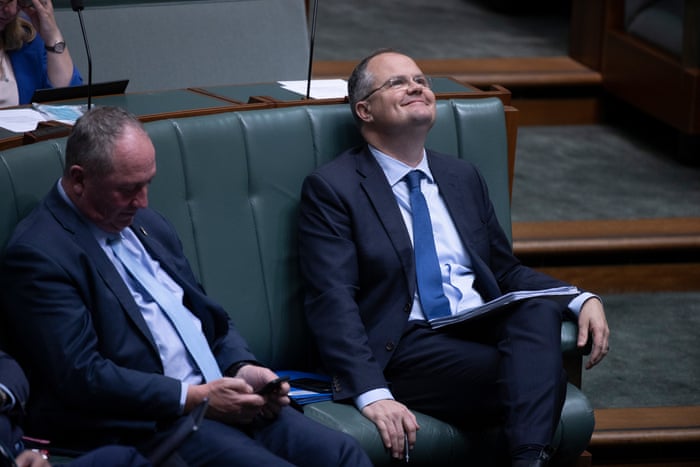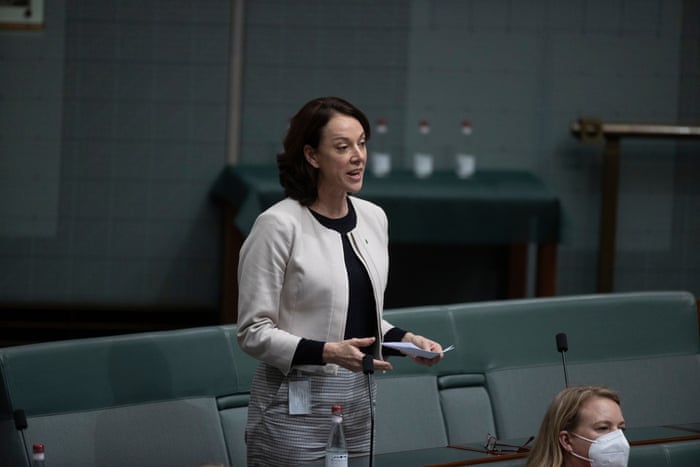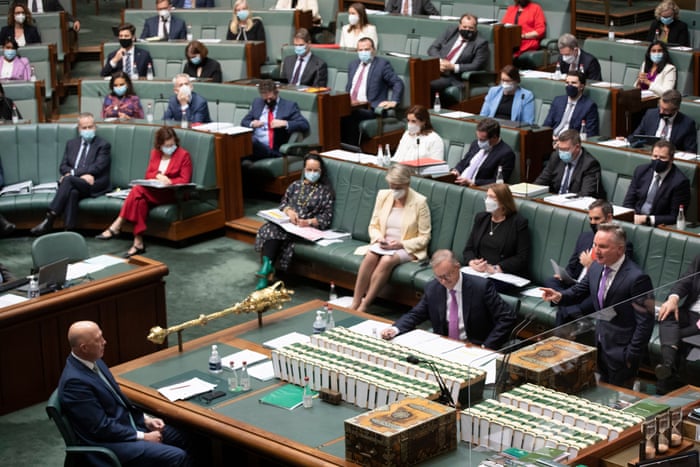Contents
Crossbenchers oppose Labor’s super changes

Paul Karp
Crossbench senators are lining up to oppose Labor’s plan to water down super funds’ disclosure of political donations and ad spending.
Opposition from Jacqui Lambie, David Pocock and Ralph Babet to the draft regulations could force the assistant treasurer, Stephen Jones, back to the drawing board or risk defeat in the Senate.
In July Jones released draft regulations that would remove the requirements for super funds to itemise their spending on political donations, payments made to related parties and marketing, allowing them to declare only totals for those categories.
The regulations would water down reforms passed by the Morrison government, aimed at discouraging super funds’ advocacy through donations, advertising and news, including support for The New Daily website.
Jones said that “unnecessary regulatory measures can impose a significant administration cost on funds and their members”.
He announced a treasury review to consider “concerns relating to the regulatory complexity of best financial interests duty requirements”, consultation for which closed on Friday.
The shadow assistant treasurer, Stuart Robert, has confirmed the Coalition will seek to disallow the regulation if and when it has made, and has written to the crossbench seeking their support. The Greens would likely have the casting vote in any disallowance vote.
Babet told Guardian Australia that “full and frank disclosure of how superannuation funds are spent on behalf of members is essential”.
“It comes a question of ‘does a super member stand to benefit from funding advertising or donation to any political party?’.”
In Senate question time on Tuesday, Lambie said it was “basic common sense” that money be spent in members best interests, and questioned whether Labor cared if “directors spend Australians’ retirement money on stuff they don’t need”.
Lambie said super funds make donations that “many members do not know and which I do not like” but “at least they have to tell members who they’re donating to and how much they’re giving them”.
Lambie questioned whether the changes were “really just about hiding super money going to Labor and the unions”. The finance minister, Katy Gallagher, rejected that, but took other questions on notice.
On Wednesday Lambie confirmed if the regulations are in line with the draft “we’ll move to disallow them”. “This is about making sure there’s transparency and accountability on all sides of politics,” she told Guardian Australia.
“If you only care about integrity and transparency when it’s applied to your opponents, you don’t care about integrity at all.”
A spokeswoman for Pocock told Guardian Australia he also has concerns about the regulation diluting transparency requirements. The Greens have not revealed their position.
Earlier on Wednesday, Robert told reporters in Canberra that Labor’s first move by treasury was “to water down transparency when it comes to superannuation”.
Robert said the Coalition changes ensure “full disclosure of donations, sponsorships, [and] payments for union picnics” due to concerns that $85m had been given by super funds in undisclosed payments.
Jones has defended the changes, arguing itemised statements “didn’t align with the accounting standards” and created a “red-tape nightmare”.
“If anyone thinks providing somebody with a 300-page document, line by line by line is providing greater accountability, that’s pretty out of touch with the way that most members interact with this,” Jones told The Australian.
Key events
The Ukrainian president, Volodymyr Zelenskiy, is about to give a special address to ANU.
I will bring you that when it starts.

Peter Hannam
I want to draw your attention to this piece from Peter Hannam – looking at the government slashing the forecast of future gains in national productivity.

Cait Kelly
Hello everyone, this is Cait. Before we start – a big thank you to Amy for taking us through the hectic morning! I will be with you for the rest of the day – so let’s get into it.
First up, I have some First Dog on the Moon – you’re very welcome.

Amy Remeikis
The parliament will keep rolling on for a bit as it works through the climate bill and the amendments.
Cait Kelly is going to guide you through the evening – and make sure you check back regularly: Murph has a piece incoming on what the Greens announcement on the climate bill means, while the rest of the team have been working non-stop to bring you everything else which has been happening today (it has been a lot).
A very big thank you to Mike Bowers for being my eyes and ears while mine were trained on a variety of screens, and for all his work bringing the parliament to you in a way my words never could.
And as always, thank you for helping me through another huge day. We couldn’t do it without you. Until tomorrow morning – take care of you.
Crossbenchers oppose Labor’s super changes

Paul Karp
Crossbench senators are lining up to oppose Labor’s plan to water down super funds’ disclosure of political donations and ad spending.
Opposition from Jacqui Lambie, David Pocock and Ralph Babet to the draft regulations could force the assistant treasurer, Stephen Jones, back to the drawing board or risk defeat in the Senate.
In July Jones released draft regulations that would remove the requirements for super funds to itemise their spending on political donations, payments made to related parties and marketing, allowing them to declare only totals for those categories.
The regulations would water down reforms passed by the Morrison government, aimed at discouraging super funds’ advocacy through donations, advertising and news, including support for The New Daily website.
Jones said that “unnecessary regulatory measures can impose a significant administration cost on funds and their members”.
He announced a treasury review to consider “concerns relating to the regulatory complexity of best financial interests duty requirements”, consultation for which closed on Friday.
The shadow assistant treasurer, Stuart Robert, has confirmed the Coalition will seek to disallow the regulation if and when it has made, and has written to the crossbench seeking their support. The Greens would likely have the casting vote in any disallowance vote.
Babet told Guardian Australia that “full and frank disclosure of how superannuation funds are spent on behalf of members is essential”.
“It comes a question of ‘does a super member stand to benefit from funding advertising or donation to any political party?’.”
In Senate question time on Tuesday, Lambie said it was “basic common sense” that money be spent in members best interests, and questioned whether Labor cared if “directors spend Australians’ retirement money on stuff they don’t need”.
Lambie said super funds make donations that “many members do not know and which I do not like” but “at least they have to tell members who they’re donating to and how much they’re giving them”.
Lambie questioned whether the changes were “really just about hiding super money going to Labor and the unions”. The finance minister, Katy Gallagher, rejected that, but took other questions on notice.
On Wednesday Lambie confirmed if the regulations are in line with the draft “we’ll move to disallow them”. “This is about making sure there’s transparency and accountability on all sides of politics,” she told Guardian Australia.
“If you only care about integrity and transparency when it’s applied to your opponents, you don’t care about integrity at all.”
A spokeswoman for Pocock told Guardian Australia he also has concerns about the regulation diluting transparency requirements. The Greens have not revealed their position.
Earlier on Wednesday, Robert told reporters in Canberra that Labor’s first move by treasury was “to water down transparency when it comes to superannuation”.
Robert said the Coalition changes ensure “full disclosure of donations, sponsorships, [and] payments for union picnics” due to concerns that $85m had been given by super funds in undisclosed payments.
Jones has defended the changes, arguing itemised statements “didn’t align with the accounting standards” and created a “red-tape nightmare”.
“If anyone thinks providing somebody with a 300-page document, line by line by line is providing greater accountability, that’s pretty out of touch with the way that most members interact with this,” Jones told The Australian.
Greens senator Barbara Pocock to chair committee on work and care
The South Australian senator said:
We need a work-care system built for the 21st century that assists working carers.
Establishing a parliamentary inquiry to examine the current work and care system and how we can create an economy that is care inclusive and narrows inequality, was a priority for me, and I’m pleased the senate has supported its establishment.
I have spent my life fighting for the rights of working people, women and low-income workers. I am an Economist and Emeritus professor and established and led the Centre for Work + Life at the University of South Australia. I am thrilled to bring this experience to the role of chair of this committee.
Working carers make up a huge proportion of the Australian workforce. In 2022, 2 million Australians provided unpaid assistance to others with a disability, long-term health condition or due to old age [according to the ABS].
Working carers need free, accessible, quality childcare. It is as essential to working life as the road that gets us to work.
Australia’s workplace laws need a renovation to give job security, appropriate leave, and decent pay to working carers.
We need to fix the work and care regimes that we labour under in Australia.
Royal Australian College of GPs welcomes Covid vaccinations for children under five
The president of the RACGP, Adj Prof Karen Price, said it was another positive step forward in the Covid-19 vaccine rollout.
This is promising news for Australian families.
With tens of thousands of new Covid-19 cases emerging every day in communities across Australia, including in children aged six months to five years, it could not come at a better time.
Once again, I remind everyone that all the Covid-19 vaccines are extremely safe and effective and will significantly reduce the incidence of people suffering severe effects from the virus, including hospitalisation or worse.
But the RACGP President warned that practices delivering Covid-19 vaccines needed more assistance
This latest announcement is good news, but it will add another layer of work for practices who have put their hands up to help deliver these vaccines.
Please be patient and don’t all rush forward at once making immediate demands for the vaccine from your usual GP. Initial supplies will be arriving in Australia later this week and given the relatively small size of the cohort to be vaccinated it is likely only a small number of practices will deliver this vaccine.
These clinics will be identified on the Vaccine Clinic Finder and bookings will open later this month, so please be patient and respectful towards general practice staff because even if they are one of the vaccination sites they won’t be able to accommodate your child right away.
In terms of children under five who aren’t yet eligible, the Australian Technical Advisory Group on Immunisation (Atagi) will continue to monitor the evidence.
This latest announcement is yet another reminder that practices need more support from government. We are already flat out delivering Covid-19 vaccines and influenza vaccines as well as delivering care to people who have delayed consultations and screenings during the pandemic.
It is important to keep in mind too that delivering vaccines to children, particularly young children, is more time intensive and complicated compared to adults.
If we are to continue as the backbone of the vaccine rollout, we really need more support from the new government. Many practices are having enormous difficulty absorbing the cost of taking part in the rollout. We didn’t sign up to make money, but at the end of the day we must make ends meet because no one benefits when a practice has to shut up shop or drop out of the vaccine rollout.
That is why once again the RACGP urges the government to step up and provide more funding for practices. If that occurs, practices will be able to run more after-hours and weekend vaccination clinics and get more vaccines in arms as soon as possible for our kids.

Christopher Knaus
Australian activist Drew Pavlou has tweeted that he may leave the United Kingdom due to delays in a police investigation into a false bomb threat against the Chinese embassy in London. Pavlou was arrested after a “small peaceful human rights protest” outside the Chinese embassy. He had intended to glue his hand to the building.
But prior to the protest, an email account that used Pavlou’s name sent a false bomb threat to the embassy.
The Metropolitan police confirmed it had received a report of a bomb threat made by email. It said it had arrested a man outside the embassy because of his “suspicious behaviour”. Its investigations are ongoing.
Pavlou has categorically denied that he sent the email and says it was clearly a fake. On Wednesday, Pavlou tweeted that he was considering leaving the UK. He said it had been 12 days since his arrest and that the investigation was dragging out.
Met Police want to drag this out forever to punish me. I’m not waiting around in limbo, I’m booking a flight out of the UK, charge me or drop the case
— Drew Pavlou (@DrewPavlou) August 2, 2022
Well, it has been absolutely non-stop since 7am this morning, so if you are still standing, take this as as moment to have a bit of a switch off and touch some grass.
Further to the obsession with ties and dress codes by some members of the Coalition on the parliament, our international site editor, Graham Russell, reminds me that NZ is, as it often is, already on the right side of this debate:
Here is some of how Mike Bowers saw question time.







